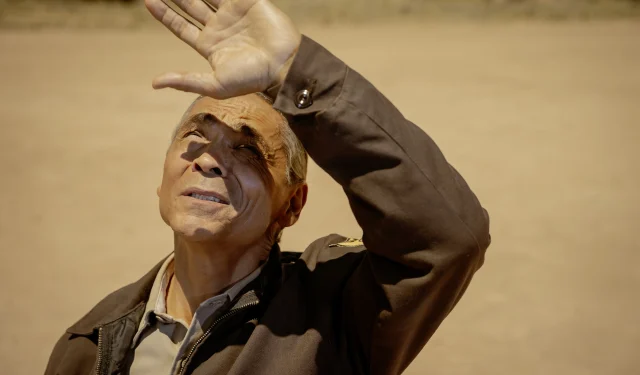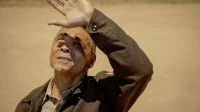[Trigger warning: This article discusses child sexual abuse and contains spoilers for Dark Winds, specifically through season three, episode six, “Abidoo’niidee (What We Had Been Told).” ]
Fans of Dark Winds have been left with much to ponder after the gripping sixth episode of its third season. The intensity of the storyline continues to build, focusing on Joe Leaphorn (played by Zahn McClarnon) as he grapples with external threats—pursuing a killer while fending off suspicion regarding his own darker actions—and his internal struggles concerning justice and personal guilt.
In this latest episode, viewers are thrust back into the haunting aftermath of an earlier attack, where Joe faced a life-threatening dart in the desert. The episode deepens the narrative by highlighting his desperate fight for survival against what he perceives as the Ye’iitsoh monster. The dart reveals itself to be more than just an object; it is laced with a mind-altering substance that induces surreal dreams, bringing forth traumatic memories related to past abuses that were hidden away in his psyche.
The episode takes a profound turn as Joe uncovers a painful truth about his father, Henry (Joseph Runningfox), who took justice into his own hands by killing the priest who abused Joe’s cousin, driven by desperation over the failures of institutional response. This familial connection sheds light on the broader theme of the divide between institutional and personal justice, illustrating the heavy toll exacted by both, as noted by Erica Tremblay, the episode’s director.
“It’s about confronting monsters, both visible and invisible. Often, the strength to face them stems from the narratives our ancestors left for us,”Tremblay remarked to The Hollywood Reporter. After a harrowing journey through his subconscious, Joe emerges from his dream and turns the tables on his attacker, discovering that, in reality, the true monster lies not beyond, but within himself.
In an interview, Zahn McClarnon delves into the multidimensional elements of this powerful episode, which merges Navajo mythology with Joe’s struggles. He expresses how relevant the abuse storyline feels personally, amplifying the stakes for Joe Leaphorn, who teeters on the brink of losing everything: his family, career, and freedom.
The Hero Twins and Their Significance
Within the episode lies a stage play featuring the Navajo creation story of the Hero Twins—Monster Slayer and Born for Water—as they confront the Ye’iitsoh. The term “Ye’iitsoh”translates to something that inspires fear and acts as a metaphor for the challenges Joe faces throughout his journey.
As the episode unfolds, Joe’s battle with his own inner demons parallels the Hero Twins’ epic struggle. The narrative momentum escalates with the inclusion of Joe’s relationship with his wife, Emma (Deanna Allison), which takes a downward spiral following revelations from earlier episodes. Their connection teeters on the edge as Joe’s neglect of her emotional needs becomes apparent during a dream sequence, exacerbating existing tensions marked by their son’s untimely death.
In this dream, Emma’s voice echoes, demanding more attention from Joe, illustrating the depths of their crisis. As Zahn describes, “This season encapsulates the anguish stemming from their son’s death and how Joe’s actions have repercussions on all those around him.”The complexities of their marriage are explored poignantly, revealing Joe’s wrestling with guilt as he prioritizes his job over his relationship.
Trauma and Reflection
Returning to the theme of childhood trauma, Joe’s memories resurface during his ketamine-induced dream. He revisits moments of helplessness from his past when he could not protect his cousin from the priest’s abuse. These memories evoke guilt and confusion, revealing the emotional toll such experiences have wrought throughout his life.
A significant revelation occurs in Joe’s dream regarding his father, who stepped in to deliver “Indian justice”with the killing of the priest. This act of violence resonates both with Joe’s torment and his father’s trauma, bringing them closer through shared understanding. As McClarnon puts it, “The episode captures the complexity of their situation, emphasizing the moral ambiguity inherent in seeking justice when the system fails.”
Navigating Moral Dilemmas
Against the backdrop of 1972, the divergence in legal systems—favoring white individuals over Native Americans—adds layers to Joe’s character as he navigates his obligations as a police officer while embodying his cultural heritage as a Diné man. He juggles these dual identities, grappling with the impact of colonialism and its implications on his sense of justice.
As the season progresses, Agent Washington (Jenna Elfman) complicates matters further, representing the complexities of justice and morality as she confronts Joe about his past actions regarding B.J. Vines. Driven by a desire to uphold the law, Joe constantly wrestles with the ethical implications represented through the character of Washington.
Creating an Honest Representation
McClarnon emphasizes the importance of maintaining authenticity throughout the narrative, particularly in the delicate portrayal of trauma and abuse. Working closely with director Erica Tremblay, he found a supportive environment conducive to exploring painful memories and truths, ultimately seeking to bring honesty to his role as Joe Leaphorn.
The collaborative efforts extended beyond just acting; McClarnon mentions the vital contributions of Indigenous consultants who ensure that the episodes authentically represent Navajo culture and customs. This commitment to authenticity not only honors the culture but also opens doors for greater understanding and appreciation of the Navajo Nation among broader audiences.
As Dark Winds continues its journey through season three, it not only tackles pressing themes of justice and morality but also invites viewers to engage more deeply with the cultural narratives of the Navajo people, emphasizing representation in a medium that has often overlooked such perspectives.
***
Dark Winds season three airs on Sundays on AMC and is available for streaming on AMC+. For additional insights, see THR’s exclusive interviews with showrunner John Wirth and co-star Jessica Matten.


